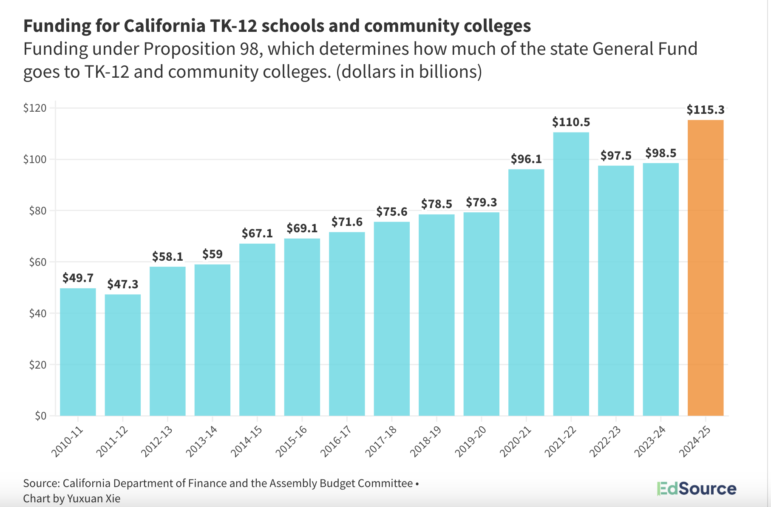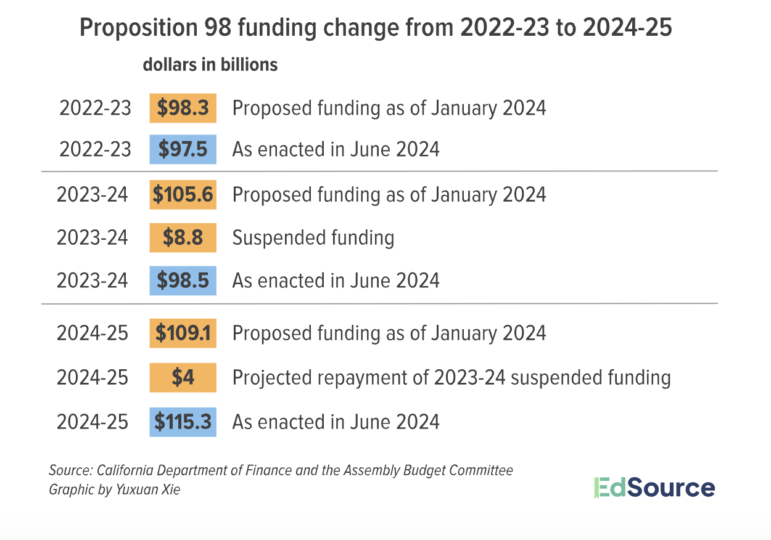True to Gov. Gavin Newsom’s promise, the 2024-25 budget compromise that the Legislature announced Saturday and will pass this week will spare TK-12 and community colleges from cuts that other state operations will bear.
TK-12 funding will be flat and will continue Newsom’s major commitments to multiyear, multibillion-dollar programs, including community schools and before- and after-school expansion.
The speech, originally scheduled for March, will be broadcast on Newsom’s social media channels: @CAgovernor X page, California Governor Facebook page, and Governor’s Office YouTube page.
The budget will even throw in a couple of billion in new revenue that Newsom didn’t call for in January or in his May budget revisions. Newsom and legislators, meanwhile, struggled to squeeze an additional $28 billion out of a $211 billion general fund spending.
But protection for schools and community colleges will carry risk. To balance the budget, Newsom and legislative leaders rely on budget maneuvers that would give a button-down accountant acid reflux.
They include creating a $6 billion debt that won’t be fully repaid to the state treasury for a dozen years, and draining most of the $8.4 billion education rainy day fund.
The deal also requires delaying payments to schools and community colleges and suspending — for only the third time in its 36-year history — Proposition 98 obligations for the current school year, on the assumption the money will be repaid quickly. Proposition 98, a constitutional amendment voters passed in 1988, established a formula for determining the minimum level of general fund spending on transitional kindergarten through grade 12 and community colleges — generally about 40%

Rather than punish schools for money already spent, the budget bill creates a $6.2 billion debt that the general fund, not schools and community colleges, will repay the state treasury over a decade, starting in 2026-27. The remaining $2.6 billion will be a Proposition 98 obligation pushed ahead to 2023-24; that unfunded amount is called a deferral.
The California State University and the University of California won’t fare as well in the budget deal, although better than Newsom had proposed in January, even with a drop in state revenues since then. Both will get a 5% budget increase in 2024-25 that Newsom had proposed delaying, equal to $227.8 million for UC and $240.2 million for CSU, to support enrollment growth of California residents this fall.
Another promised 5% budget increase for both systems in 2025-26, however, will be put off a year. UC and CSU also face one-time cuts in 2024-25 of $125 million and $75 million, respectively, which will be restored in 2025-26.
Both CSU and UC will also face a 7.95% cut in their administrative expenses in 2025-26.
There will be no reforming the Cal Grant program in 2024-25, but, at the Legislature’s insistence, the $637 million ongoing funding for middle-class scholarships will continue, with a $289 million one-time increase.
Late spending changes
The final budget will also restore some TK-12 and child-care cuts that Newsom had proposed in his May budget revision while maintaining others. They include:
- Restoring $60 million for the Golden State Teachers Program, which provides $20,000 in scholarships to teacher candidates, although a new means test may pare back $10 million in eligibility.
- Restoring $100 million in funding to help preschools prepare classrooms and train teachers in order to enroll more children with disabilities, while withdrawing larger plans to expand the program.
- Continuing the existing agreement to serve 200,000 more children in the state-subsidized child care system but pushing back the timetable for full compliance to 2028.
- Rescinding $895 million in one-time spending on electric-powered school buses that Newsom had made a priority. Instead, the money will be used to reduce some of the late payments in state funding for schools.
School districts receive the bulk of their funding through the Local Control Funding Formula, which is based on daily student attendance and a yearly cost-of-living adjustment. So, even though overall state funding won’t be cut, many districts with declining enrollments and high absenteeism rates will face financial challenges.
The cost-of-living adjustment (COLA), which is based on a federal formula tied to the cost of goods and services but does not factor in regional costs, including housing, will be only 1.07% for 2024-25, forcing further belt-tightening. One option for school districts, giving layoff notices to staff, will be off the table. State law allows an additional round of layoffs in August in years when the COLA is less than 2%, but, at the urging of public employee unions, Newsom and legislative leaders included a clause prohibiting late summer layoffs. They have done the same statutory override before.
The initial reaction from two veteran TK-12 budget watchers was mixed. “This budget remarkably insulates K-14 funding from cuts, abides by constitutional requirements to restore funding in the future, and even provides a modest cost-of-living increase, all amid a record budget shortfall. Pretty amazing,” wrote Kevin Gordon, president of Capitol Advisors Group, a school consultancy firm.
Rob Manwaring, senior policy and fiscal adviser with the nonprofit advocacy organization Children Now, was cautious. “While the final budget is perhaps the best schools could anticipate given the budget challenges, we worry about the size of the suspension for schools, $8.3 billion,” he wrote. “Schools will eventually get paid back those funds in future years on top of the minimum guarantee, but these payments will result in increased school funding volatility and uncertainty until they are paid back.”
And if revenues falter next year, schools and community colleges will no longer have a rainy day fund to turn to, since it will be depleted.
Proposition 98 juggling act
The proposed 2024-25 budget for schools and community colleges will be balanced, if revenue projections hold true, by juggling three years of Proposition 98 shortfalls, with one year’s solution creating the next year’s dilemma.
The big drop was in 2022-23 when the Legislature “over-appropriated” the minimum Proposition 98 guarantee by $8.8 billion, while state revenue from the post-Covid stock market and the tech sector plummeted. Legislators didn’t see the warning signals because winter storms had pushed back the tax filing deadline from April to November.
Under the mechanics of Proposition 98, the funding level for 2022-23 becomes the base level for 2023-24, even though the state still lacks the revenue to pick up the tab. So all but $1 billion of the $8.4 billion in the education rainy day fund will be drained to cover some of the 2023-24 deficit and the $2.6 billion deferral from the year before.
On top of that, the budget deal calls for suspending $8.3 billion of the Proposition 98 funding for 2023-24. That has the effect of lowering the minimum guaranteed funding by that amount, while freeing up money to avoid deeper cuts in other state operations. That’s how the Legislature can restore cuts in 2024-25 for child care and preschool that Newsom had planned.
The architects of Proposition 98 wanted to discourage the Legislature from suspending the law. So it requires the Legislature to declare a fiscal emergency and to make the suspended funding a priority for repayment as soon as there is new revenue. The 2024-25 budget assumes the state will have enough new revenue to pay back at least $4 billion of the suspended $8 billion, maybe more. But if revenues falter, districts won’t get what they’re entitled to, with no set date for repayment.

That’s why the deal is also a gamble for schools and community colleges.
There’s one more wrinkle. To raise revenue quickly, the Legislature has accelerated the temporary, three-year suspension of two tax benefits for large and medium-sized businesses: net operating loss deductions and tax credits. The period will start in 2024-25, one year ahead of schedule. It will yield a projected $5 billion, with $2 billion going to Proposition 98 — funding that will be used to pay down deferrals.
Between this new money and the $4 billion payback for suspended funding, the Proposition 98 minimum guarantee is expected to rise to a record $115.3 billion in 2024-25.
As with all deadline negotiations, legislators will have at most three days to review hundreds of pages of budget details spread over 16 separate bills. Newsom, Senate President pro Tempore Mike McGuire, D-Healdsburg, and Speaker of the Assembly Robert Rivas, D-Hollister, are expecting that legislators will demand some changes when they return from vacation in August.